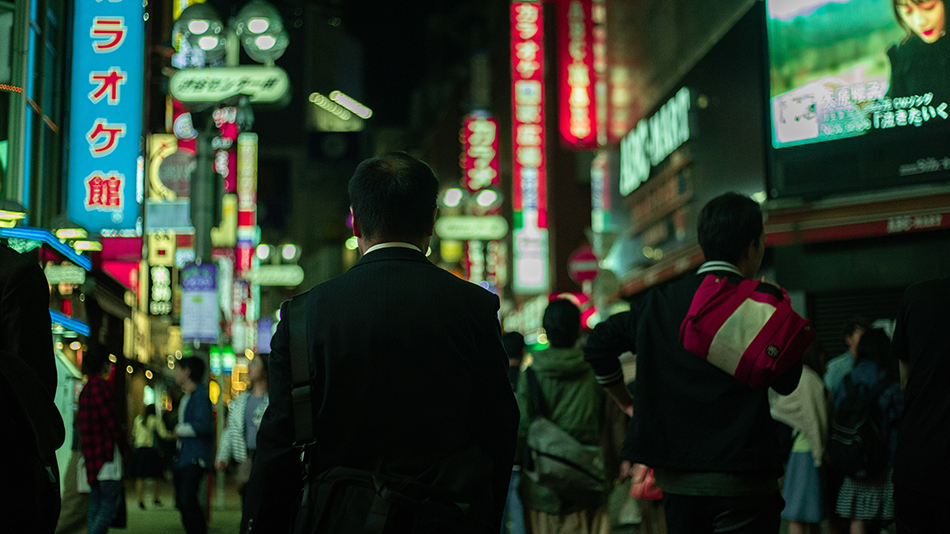With the upcoming Rugby Worldcup in Japan, the tattoo taboo has resurfaced. How is it to want a tattoo in a country where you can get fired because of this same tattoo?
It’s getting late in the Kyoto’s senior high school, the classroom is getting dark. Yusuke is explaining to his students how to use photoshop. But it’s been really difficult to focus over the last few hours. Yusuke’s head is somewhere else, thinking about this important decision he made a few months ago, and the deadline is approaching. In a few days Yusuke is going to get a tattoo. Here in Japan, for workers in many private and public companies, having a tattoo on a visible part of the body might lead to get fined or worse, fired. Despite this, Yusuke is well decided to get his first tattoo.
As for many people, Yusuke’s interest in tattoo comes from a friend. “One of my friends from Indonesia introduced me to her favorite tattoo artist and I really liked his work. Since then, I’ve become interested in tattoos” says Yusuke. For months he has been thinking about what kind of tattoo and where, the only sure thing for now is that this “will be a small tattoo”. Mainly because in the school where Yusuke is currently working, tattoo is prohibited if it is “on a part of the body where people can see it”. A common thing in Japan. Either in a public or private working place, people are asked not to have a tattoo on a visible part of the body. This is not really a law, but more like “a tacit agreement” says Yusuke.

In some areas, rules about tattooing have got stricter.
Dr. Hood
It seems logical that you have to be presentable at the workplace, especially when you are in contact with the customers. In Japan, France or many other countries, it would probably not be allowed to show full tattooed arms while working in a bank, a shop or another company like that. However, in the recent years, the prefecture of Osaka has pushed this strategy further and has asked civil servents to declare if they had a tattoo, even on a non-visible part of the body.
This tattoo ban has not only impacted public workers and Christopher Hood, researcher at Cardiff university, has witnessed it through the Japanese Exchange Programe (JET). “In some areas, rules about tattooing has got a lot stricter” he says, and a few years ago Japan stopped allowing tattooed people to apply to the JET program. Dr. Hood says they had two cases where the applicants got on the program and kept their tattoos covered up and hidden but another person got rejected, only because he admitted having a tattoo on a non-visible part of the body. Something that Dr. Hood deplores because “that never used to happen” he says.
Made with Visme Infographic Maker
This tighten in tattooing regulations has been observed in a few places around Japan and especially in the Osaka prefecture. In 2014 the local authorities decided to list the number of tattooed civil servants and asked them to fill a form indicating their tattoo and location on the body. A decision that has been criticised by a few people claiming this was a discriminative policy.
According to the Japan Times, 110 of the questioned workers answered they had one or more tattoos. Among them, 98 admitted they had a tattoo on a visible part of the body. Toru Hashimoto, Mayor of Osaka at that time even advised city workers to resign and find a job in private sector, claiming that was not acceptable for civil servants to make the population uncomfortable because of their tattoos.
This decision was made after a child apparently got scared because of a school clerk’s tattoos. It shows how taboo tattooing is in Japan. Even though tattooing existed before the Yakuza, people have associated it to the crime syndicate over the centuries. Christopher Hood is specialised in Japanese society and symbolism, and he explains that Japanese tattooing may be a symbol of Japan but “symbols change over history” and this is what has probably happened to Japanese tattooing.
The importance of symbolism in Japan
One of the reasons for the fear and suspicion around tattoos is the link with the yakuza. Traditional Japanese tattooing, generally called Wabori or Irezumi in Japan, has been linked to the Yakuza for centuries now and is one of their main characteristics, with quite often a few missing fingers. When Japanese people or foreigners see a Japanese man with massive traditional tattoos in Japan, they will often associate him to Yakuza, even if the poor man does not have anything to do with any criminal activity.
But our world now lives in a “very image driven society” and we are used to stigmatize things easily according to Dr. Hood. For instance, people traveling to Japan basically take and “post the same pictures they could have downloaded for free from Google” says Dr. Hood, before asking “Why did they even go?”. And this is the same thing with tattoos, if “the only Japanese people with tattoos we see are Yakuza” says Hood, then this becomes almost normal and unconscious that people keep doing this association between tattoo and criminality in their mind.
Even despite que upcoming Rugby Worldcup and Olympics, this association of tattoo to Yakuza and its perception in Japan might be difficult to change. If Yusuke seems positive about a near change, Dr. Hood actually thinks that a change would need something more than foreign tattooed athletes coming to Japan. “They already have famous tattooed Western football players who play in Japan and nobody says anything” he says. However, “if they suddenly had a Rikishi or Sumotori (a Sumo wrestler), because they’re considered as half-gods, or a famous baseball player, maybe this would change” says Christopher Hood.

This brings back to the important idea of symbolism. Football is quite big in Japan but Rugby has only gain popularity over the last few years. On the other hand, baseball is the national sport and Sumo wrestling is an old traditional sport in which the fighters are highly considered in Japanese society. If huge athletes from those disciplines were starting to get and show tattoos, this might push people to change, or at least to open a bit more their perception of tattooing.
In Kyoto, the class is finished for the teacher. As he is packing away his stuff and getting ready to leave his classroom to go home, Yusuke is thinking a bit more. He does not really mind about the rules of the school since his tattoo will not be visible but he’s kind of worrying about his parents and some of his friends’ reaction. “I haven’t told them and I think I will not” says Yusuke, “my family will be very disappointed”.
Japan is a shame-driven society.
Yusuke
Japan relays on a normed and collective society in which the will to set away can be perceived in a very negative way. Since getting a tattoo is somehow a very personal way to step away from the other people, the risk is to end up marginalized. Yusuke explains that Japan is a “shame driven society” and “many people will think this is a shame” to have a tattoo and to step out of the norm. They will even claim that the tattoo discrimination is “fair”. A recurrent reaction observed with older generations and especially “people from my grandma’s generation” says Yusuke.
This negative view, especially in older generations mind might also come from a more traditional mindset. Tattooing may have a bad symbolic because of the “body modification” itself. Basically, people who get tattooed “mess with the body offered by their parents” says Dr. Hood and this can be another reason for the bad symbolic of tattoos in people’s minds. What your parents give you is kind of considered as sacred here and shouldn’t be altered. This issue with the older generation seems to be important as the next generation might start reproducing the same anti-tattooing behaviour on their children. If so, tattooing in Japan might stay stuck in this kind of vicious circle for a while.
Yusuke’s finally back home. He’s been thinking a lot today about his decision of getting a tattoo. But he’s not gonna change his mind. Despite all the social issues that tattooed people may face here in Japan, he’s made his choice, and he’s also very positive about seeing a change over the next few years thanks to the Rugby Worldcup and Olympics.

